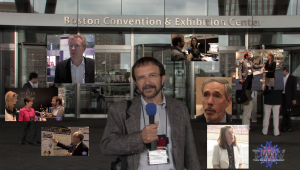Host: Vincent Racaniello
On episode 99 of the podcast This Week in Virology, Vincent tours the 50th Interscience Conference on Antimicrobial Agents and Chemotherapy (ICAAC) in Boston, speaking with exhibitors and visitors, including Professors Derek Smith, Michael Schmidt, Frederick Hayden, and Myra McClure.
Many thanks to Chris Condayan and Ray Ortega of the American Society for Microbiology for recording and editing this episode.
Click the arrow above to play, or right-click to download TWiV #99 (45 MB .mp3, 62 minutes)
Subscribe (free): iTunes, RSS, email
Links for this episode:
- 50th ICAAC
- ICAAC daily press conference videos (including Prof. Myra McClure)
- Antigenic cartography
- Antimicrobial properties of copper
- Video of this episode – view above or at YouTube
Send your virology questions and comments to twiv@microbe.tv.



This TWiV was a nice format and nicely done, Prof. Racaniello. You did a good job as usual with the questions and the video itself was very neat looking so props to the camerapersons and video editors along with the interviewer and interviewees.
A comment on the new poster technology. Having every poster available for anybody to download and take home (and send to anybody else) raises some issues. Most poster data is pre-publication and has not been vetted nor peer-reviewed. Moreover, the work may be incomplete. If anybody can take it and scrutinize it or scoop it, enthusiasm for presenting unpublished, new and exciting data may be dampened.
Right, but I think the fact that there is evidence that the owner of the poster presented the data first would protect them. If that person presents there data, and then two weeks later someone comes out with the same data, I think they would have a good case for themselves, and would the copier be penalized for academic….copyright? (i’m not sure if copyright is the correct word. Maybe just ‘academic dishonesty?)
The poster printing technology is opt-in. If you don’t want to participate, you don’t have to.
This is not to be read on air, or even about this podcast. I should post this in TWIP, but I thought this mail would get read more often.
Has anyone thought about microbes and sound? How they hear? Viruses can’t even in theory, but bacteria and protozoa could. They live in liquid, liquid carries vibrations. Perhaps they perceive their world like a blind man, who can tell roughly what size room he is in, not by a specific sound, but by the ‘ambience’ of the space.
Should be easy to do some experiments, with a (little) microphone. Then try to mimic it with a (little) speaker and a signal generator.
And objects that small can move on waves (or standing waves). Maybe baccilli “surf” right towards flagelates. Or sneak up the “baffles” like a Russian submarine on an American one.
Also, since it flagella/cilli move at a rate that can be measured, some one could compensate for size and density and convert those sounds, so you could hear what is sounds like for a bacterium to swim by. I’m sure a single flagellum would sound different, and a spirochete would sound different from that.
just a thought…
So where did McClure get her serological assay?
http://listserv.nodak.edu/cgi-bin/wa.exe?A2=ind1009D&L=co-cure&P=R2806
From Suzy Chapman
28 September 2010
Circulated on behalf of a member of the public:
May be reposted
FoI request to Imperial College London ref XMRV serology test
Following Professor Myra McClure’s statement (in the Q&A session of the 1st
International XMRV Workshop ) that “We’ve now done the serology”, a Freedom
of Information request was submitted to Imperial College London on 10th
September 2010 to identify whether they had developed a serology test for
XMRV. This included the following.
(i) Confirmation of whether Imperial College London has developed a
serology (anti-body) test for XMRV (xenotropic murine leukaemia-related
virus).
(ii) If this test is for both ME (also known as CFS) and prostate cancer
combined, or for just one of these diseases in isolation, or if there are
separate tests for each of these diseases.
(iii) If this test detects anti-bodies to all MLVs (murine leukaemia
related viruses) or just XMRV.
(iv) If this test is used for research purposes only or if it is available
commercially or if there are plans to make it available commercially.
(v) If this test has been developed for specific research purposes within
Imperial College London, or other research institution, and if these
research purposes will be published (e.g. in a science journal or on the
college website) and when.
(vi) How long the test has been in use (for research purposes or
otherwise).
The following response was received on 27th September 2010.
“Further to your Freedom of Information request, Imperial College has not
developed a serology (anti-body) test for XMRV and therefore the remaining
questions (ii – vi) are not applicable.”
———————-
It is unclear, therefore, which/whose XMRV serology assay is being used by
Professor McClure and, given that it has not been developed by the Imperial
team itself, how they are able to vouch for its reliability. If the assay
in question has been proven empirically to detect XMRV antibodies and,
given the growing number of UK patients who are testing positive via the
Whittemore Peterson Institute/National Cancer Institute’s methods,
Imperial’s continued failure to detect the retrovirus implies that either
they have a flawed sample cohort and/or (as discussed at the 1st
International XMRV Workshop) they could be using contaminated test tubes.
Dr McClure did not say (at least in my ICAAC interview) that she had developed a serological assay for XMRV. She said the assay was not specific for XMRV; it was to look for xenotropic MLVs, and it was done by a collaborator at another institution. All of which may explain why Imperial College answered your FOI request as they did.
At the XMRV conference she said they had done the serology. This is why someone decided to ask under a FOI request for clarification. I know in your interview McClure said two assays from Itzui were used, which were none specific for XMRV. I only posted the this to help explain the situation.
Prof. R.- interesting twiv- “like”-worthy as always,- nice to see you and not just hear your voice.
you did a good job of calling ME (aka ‘CFS’)- “chronic fatigue syndrome”- only once did you drop the ‘syndrome’ and give us the dreaded “CF.” You may have noticed Prof. McClure calls it CF always- a bit of sloppiness that causes a lot of confusion. She seemed reasonable here, completely unlike her totally unprofessional and anti-scientific misrepresentations in the press when she released her flawed study.